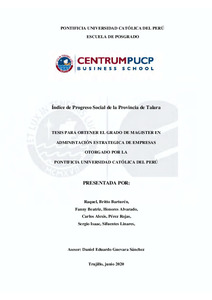Índice de Progreso Social de la Provincia de Talara

View/
Date
2020-09-02Author
Britto Barturén, Raquel
Honores Alvarado, Fanny Beatriz
Pérez Rojas, Carlos Alexis
Sifuentes Linares, Sergio Isaac
Metadata
Show full item recordAbstract
Ante la necesidad de usar nuevas métricas que permitan cuantificar de manera
holística, transparente y objetiva el desempeño social y ambiental de un país, provincia o
distrito; el Social Progress Imperative crea el Indice de Progreso Social, herramienta que
permita evaluar a través de sus tres dimensiones: la satisfacción de las necesidades humanas
básicas, los fundamentos de bienestar que permitan mejorar la calidad de vida de sus
ciudadanos y las oportunidades que conlleven a alcanzar su máximo potencial, así mismo,
esta herramienta permite comparar los resultados entre economías similares y la gran
capacidad de transformar el progreso económico en progreso social a través de mejores
políticas de gobierno.
El presente estudio permitió calcular el Indice de Progreso Social de la provincia de
Talara empleando la metodología del Social Progress Imperative el cual fue desarrollado bajo
un enfoque cuantitativo, un diseño no experimental y un alcance descriptivo, obteniendo un
resultado de 61.71 puntos y ubicándose de esta menera en un nivel de progreso social medio
bajo; asi mismo la dimensión Necesidades Humanas Básicas se ubicó en un nivel de progreso
bajo con 52.79 puntos, mientras que la dimensión Fundamentos de Bienestar alcanzó un
nivel de progreso medio bajo con 58.42 puntos y finalmente la dimensión Oportunidades que
alcanzó mejores resultados al ubicarse en un nivel de progreso social medio alto con 73.91
puntos.
Adicionalmente los resultados obtenidos del presente estudio han permitido
especificar las fortalezas de la provincia las cuales se presentan a través de los componentes
seguridad personal, acceso al conocimiento básico y tolerancia e inclusión por otro lado, los
puntos de mejora se muestran mediante los componentes de nutrición y cuidados básicos,
agua potable y saneamiento, acceso a información y telecomunicaciones, salud y bienestar,
sostenibilidad ambiental y derechos personales.
A nivel zonal, destaca la zona compuesta por el distrito de Pariñas (zona 3) quien
obtuvo 64.81 puntos, le sigue la zona compuesta por el distrito de Mancora (zona 1) quien
consiguió 61.75 puntos, posteriormente la zona compuesta por el distrito La Brea (zona 4)
con 59.82 puntos y por último la zona compuesta por los distritos de Los Organos, EL Alto y
Lobitos (zona 2) con 57.66 puntos; ubicádose todos en un nivel de progreso social medio
bajo, y si bien es cierto todos los distritos se ubican en el mismo nivel de progreso social, la
puntuación varía uno del otro lo cual nos indica que existen brechas por cubrir las cuales
deben ser atendidas mediante la participación conjunta y estratégica del gobierno local,
regional, nacional, la empresa privada y la misma comunidad con la finalidad de mejorar el
desempeño social y ambiental de la provincia. Given the need to use new metrics to quantify in a holistic, transparent and objective
way the social and environmental performance of a country, province or district; The Social
Progress Imperative creates the Social Progress Index, a tool that allows evaluation through
its three dimensions: The satisfaction of basic human needs, the foundations of well-being
that allow to improve the quality of life of its citizens and the opportunities that lead to reach
its maximum potential, likewise, this tool allows to compare the results between similar
economies and the great capacity to transform the economic progress in social through better
government policies.
The present study allowed to calculate the Social Progress Index of the province of
Talara using the Social Progress Imperative methodology which was developed under a
quantitative approach, a non-experimental design and a descriptive scope, obtaining a result
of 61,71 points and being placed in this way in a level of social progress medium low;
likewise the Basic Human Needs dimension was placed in a low level of progress with 52.79
points, while the Welfare Fundamentals dimension reached a medium low level of progress
with 58.42 points and finally the Opportunities dimension that achieved better results when
placed in a medium high level of social progress with 73.91 points.
In addition, the results obtained from the present study have made it possible to
specify the strengths of the province, which are presented through the components of
personal security, access to basic knowledge and tolerance and inclusion; on the other hand,
points for improvement are shown through the components of nutrition and basic care,
drinking water and sanitation, access to information and telecommunications, health and
well-being, environmental sustainability and personal rights.
At the zonal level, the area composed of the district of Pariñas (zone 3) stans out, who
obtained 64.81 points, followed by the area composed of the district of Máncora (zone 1) who obtained 61.75 points, later the area composed of the district La Brea (zone 4) with
59.82 points and finally the area composed of the districts of Los Organos, EL Alto and
Lobitos (zone 2) with 57.66 points; all of them are located at a medium low level of social
progress, and while it is true that all districts are located at the same level of social progress,
the score varies from one another which indicates that there are gaps to be filled which must
be attended through the joint and strategic participation of local government, regional,
national, private enterprise and the community itself in order to improve the social and
environmental performance of the province.
Temas
Indicadores económicos--Perú--Talara (Piura : Provincia)
Indicadores sociales--Perú--Talara (Piura : Provincia)
Investigación cuantitativa
Indicadores sociales--Perú--Talara (Piura : Provincia)
Investigación cuantitativa
Para optar el título de
Maestro en Administración Estratégica de Empresas
Collections
The following license files are associated with this item:





